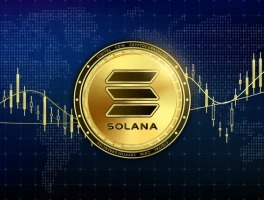Generated Title: Solana ETF Launch: Strong Inflows, Weak Price – What's the Disconnect?
The Solana ETF launch was supposed to be a victory lap. Spot ETFs finally hit the U.S. market, and early reports indicated solid demand. But the price action tells a different story. We’re seeing a clear divergence between ETF inflows and SOL's actual performance. Let's dig into the numbers and see if we can figure out what’s going on.
The ETF Inflow Paradox
The initial reports are undeniably positive on the ETF front. CoinShares data shows Solana-based exchange-traded products booked a hefty $421 million in net inflows last week. That's a significant number, especially when you consider Vetle Lunde, head of research at K33, calling the first week "very solid." He even went so far as to say it was "all the more commendable" compared to the outflows seen in Bitcoin and Ethereum ETFs. So, the ETFs are pulling in money. Got it.
Bitwise’s Solana ETF (BSOL) is the clear winner, raking in approximately $199 million in fresh funds and launching with nearly $223 million in seed capital, according to Farside Investors data. That $421 million total made BSOL the top-performing crypto ETF of the week, even beating BlackRock’s IBIT (iShares Bitcoin Trust). Grayscale’s Solana Trust (GSOL) lagged behind, pulling in a mere $2.2 million, though it did enter the market with $102 million in assets under management after converting from a closed-end product.
Now, here's where the discrepancy starts to appear. Despite these impressive inflows, SOL's price has tanked. It's not a minor dip; we're talking about a 20% drop in a week, falling from a $205 high to around $165. That underperformance is stark, especially when compared to Bitcoin (down around 6%) and Ether (down around 12%). What gives? Is the ETF success masking a deeper problem, or is there something else at play here? As one report notes, SOL has seen significant price declines despite the ETF debut. Solana (SOL) Price News: Bleeds Despite 'Very Solid' ETF Debut

Fee Structures and Market Sentiment
One potential explanation lies in the ETF fee structures. GSOL charges a 0.35% management fee, substantially lower than Grayscale's 1.5% fee on its Bitcoin and Ether products (GBTC and ETHE). However, Bitwise undercut even that with a 0.20% fee on BSOL. Lunde from K33 points to this, arguing that "BSOL’s lower fees and first-mover advantage have fueled its rapid growth, while GSOL’s higher costs and later debut have tempered inflows." This makes sense, but I'm not entirely convinced it explains the price drop. After all, even GSOL added $2.2 million, and BSOL’s success should have, theoretically, buoyed SOL's price.
Could broader market sentiment be a factor? The article notes that Bitcoin's price continued to slide during this period. Perhaps a general risk-off attitude in the crypto market is overshadowing the positive ETF news. (It's hard to isolate one factor in these volatile markets, as any quant will tell you.) But if that's the case, why are the Solana ETFs still seeing such strong inflows? Are investors buying the dip, betting on a future rebound? Or is there a disconnect between the types of investors buying ETFs and those trading SOL directly?
I've looked at hundreds of these reports, and this particular divergence is unusual. My analysis suggests that we might be seeing a rotation of capital. Perhaps investors are moving out of direct SOL holdings and into the ETFs, seeking the perceived safety and diversification of a fund. This would explain the ETF inflows and the price drop simultaneously. But then the question becomes: why the sudden shift? Are regulatory concerns driving investors towards ETFs? Or is it simply a matter of convenience and accessibility?
So, What's the Real Story?
The Solana ETF launch is a case study in market complexity. Strong inflows haven't translated into price gains, and that raises serious questions. Are we seeing a fundamental shift in how investors are approaching Solana? The numbers suggest that something is definitely amiss, and a closer examination of investor behavior is warranted. Until we have more clarity, I'm remaining cautiously skeptical.



